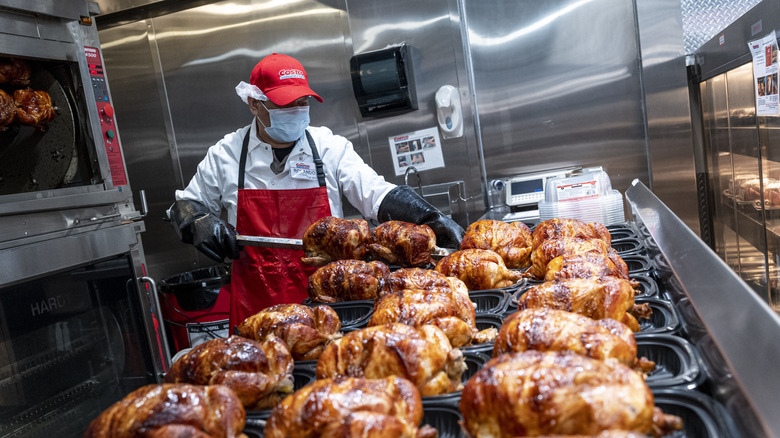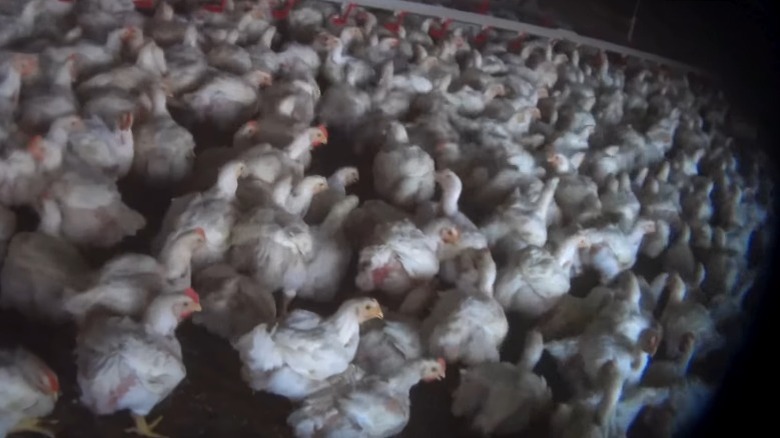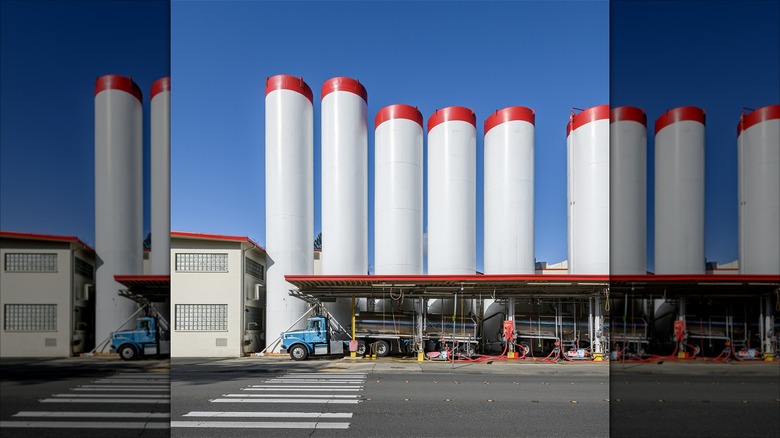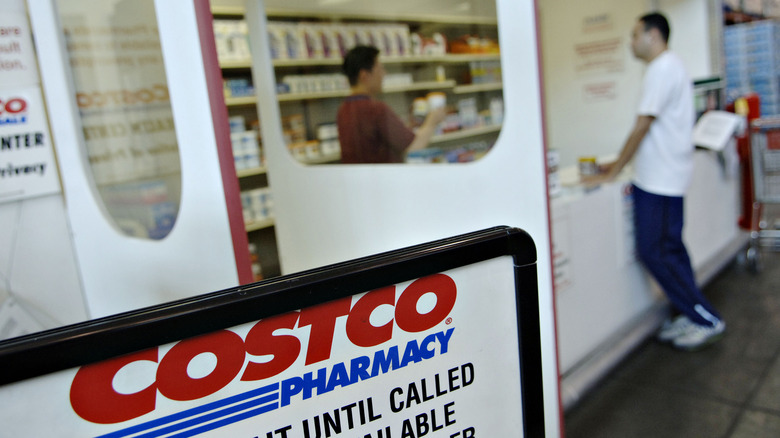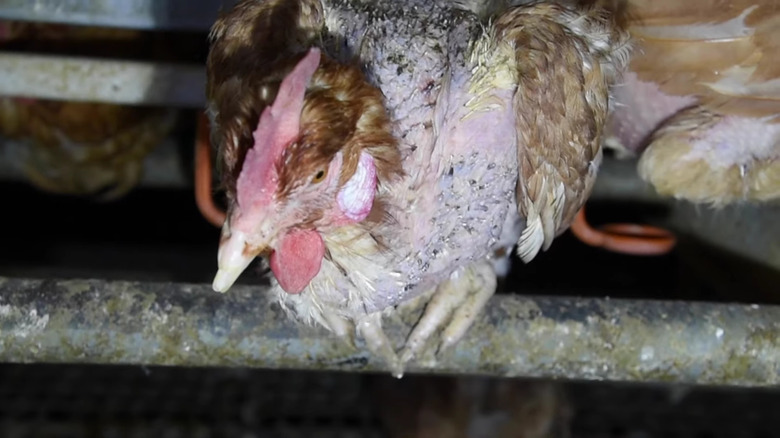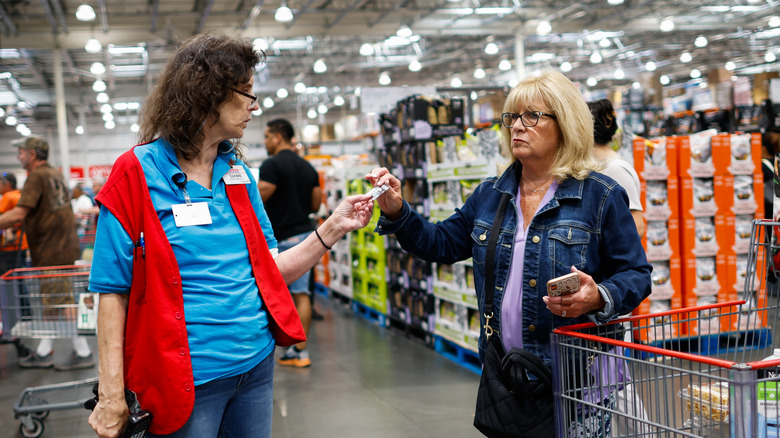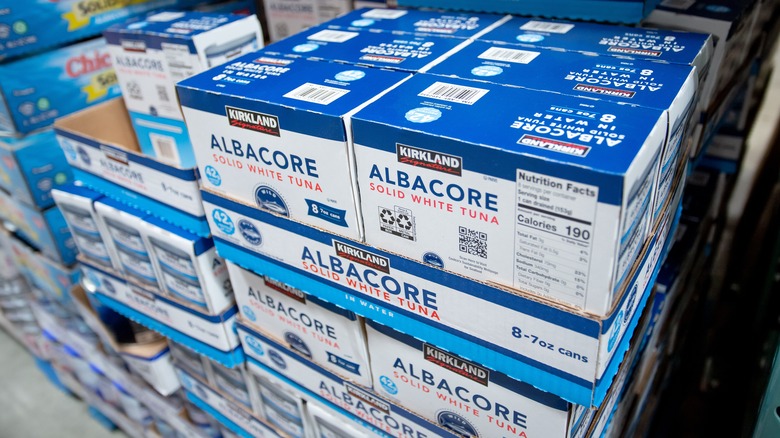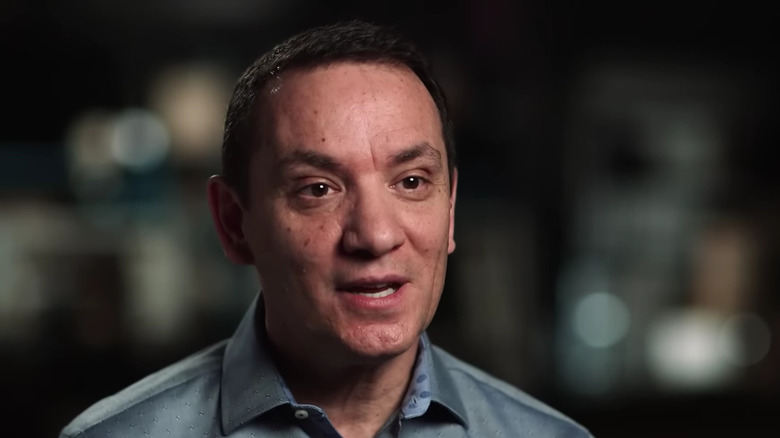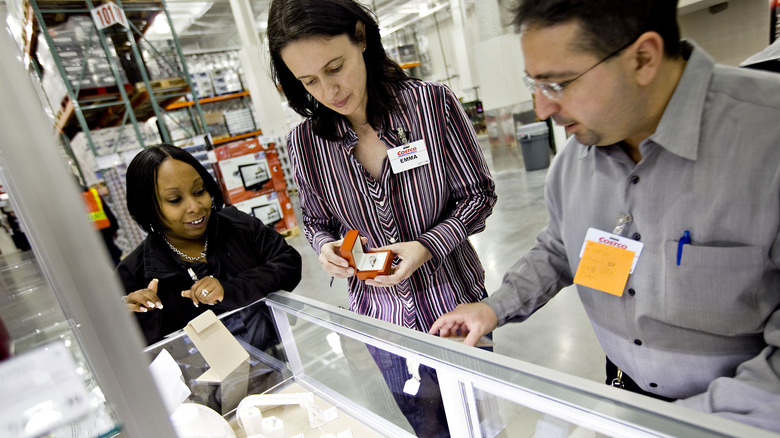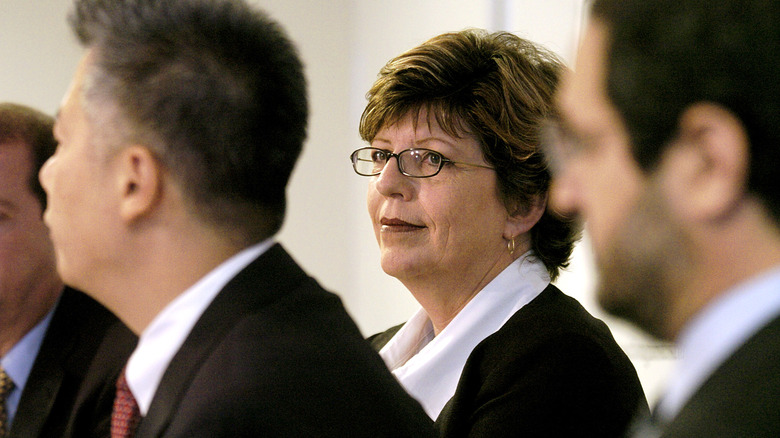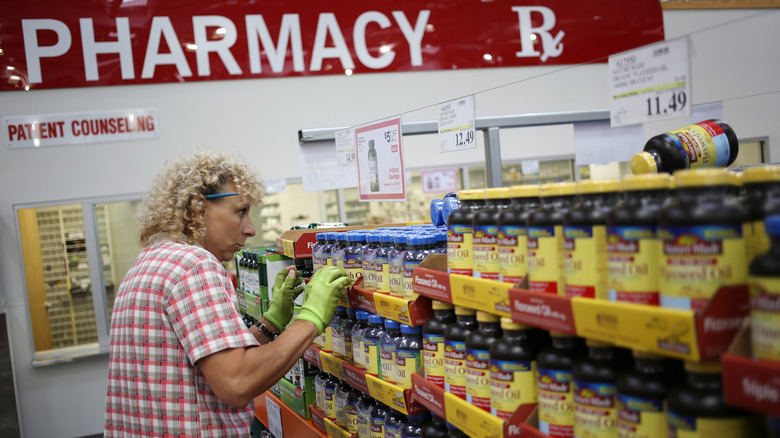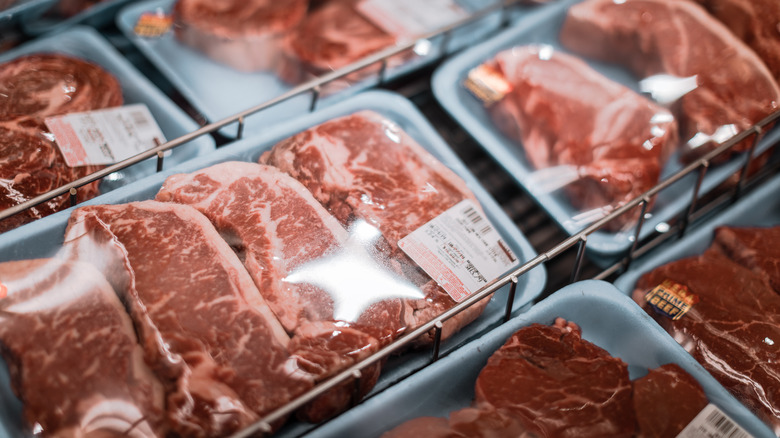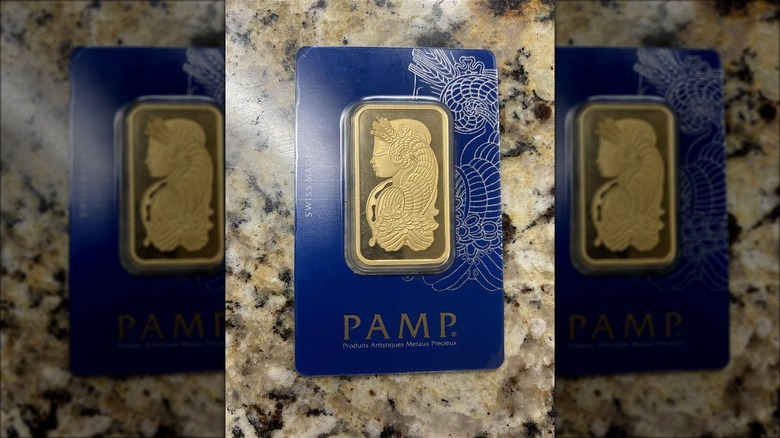What Costco Doesn't Want Customers To Know
Costco boasts nearly 130 million members worldwide. The vast majority of these are found in the United States, but regardless of whether they're shopping in the U.S. or abroad, customers turn to Costco for the same reason: the store's shockingly low prices.
Bargains form the basis of Costco's brand, and discounted products can be found everywhere in the store. Furthermore, some of the store's most iconic products — such as the $4.99 rotisserie chicken or $1.50 hot dog and soda combo – have not experienced price increases for years. But while the prices of these products are widely and frequently celebrated, few customers are aware of the outsized social, environmental, and ethical costs associated with them.
In an effort to drive down prices and maximize profit, Costco has been linked with some rather unsavory business practices including rearing animals in horrible conditions, the use of illegal labor, and questionable product labeling. Although prices remain low, it appears that Costco's well-loved bargains do not come cheap.
Costco's chickens were reared inhumanely
Costco's $4.99 rotisserie chicken is the store's most celebrated product. In fact, the cheap chicken is so integral to the brand that Costco has spent $1 billion building an industry-leading chicken processing plant in Nebraska with the sole goal of streamlining its rotisserie chicken supply chain. That being said, a $4.99 chicken is never going to be far from controversy, and Costco's rotisserie chicken has received its fair share of criticism in recent years.
The majority of these complaints stem from a 2021 investigation of a Costco-controlled poultry farm. Videos taken by nonprofit organization Mercy For Animals showed birds living in cramped, filthy conditions. Some were even suffering from open wounds. When confronted with the evidence, Costco claimed to the New York Times that much of the footage was unremarkable and also stated that the company adhered to standards laid out by trade associations (via CNN). Despite pressure, Costco has not followed the lead of many other food businesses and signed on to the Better Chicken Commitment, a welfare policy designed to improve the lives of industrially reared broiler chickens.
Following the Mercy For Animals investigation, two shareholders, represented by the litigation nonprofit Legal Impact for Chickens, launched a lawsuit against Costco. The lawsuit alleged that decisions made by Costco executives caused the company to neglect its livestock, meaning the fast-growing chickens were often unable to access food and water. The case was dismissed, but during the summer of 2023, Costco announced it was reviewing and investigating the issue. No actions have been reported.
Several Costco products have been linked with child labor
An article published by The New York Times at the end of 2023 alleged that numerous migrant children were and are working for the producers of various Costco products. According to the article, the vast majority of these children use forged documents to gain and keep employment. Lax checks and the huge workforces associated with many plants and factories mean that child workers are often missed by private auditors, while senior employees often turn a blind eye. What's more, auditors rarely visit businesses during the night shift when child labor is most prevalent.
As part of its article, NYT interviewed Miguel Sanchez, a child migrant who works at Darigold, a milk supplier for Costco. In his interview, Sanchez detailed dangerous working conditions that resulted in him suffering from an injury. Other workers noted that minors were a common part of the workforce.
This is not the only instance of child labor linked with Costco. Underage workers have also been found to work in sanitation teams, cleaning slaughterhouses which supply Costco with meat. Packers Sanitation Services, the company that employed these minors, had over 100 underage workers on its payroll and was fined $1.5 million. In all these instances, Costco has said it was not aware of any child labor practices in its supply chain.
Customers' private health data was shared with Meta
Costco boasts a pharmacy as part of its business. As with any pharmacy, Costco's pharmacy frequently requires and receives customers' private healthcare information, including their prescriptions and prior illnesses or conditions. This information is both private and sensitive, meaning it should be treated with the utmost care. Unfortunately, Costco has not always managed to do this.
According to The Seattle Times, a lawsuit raised against Costco in 2023 alleged that the company had shared millions of Americans' medical information with Meta without customer consent. This was due to Costco's improper use of Meta Pixel, a tracking code that is designed for use as a business tool. By having Meta Pixel active on the health care section of Costco's website, any sensitive information that customers entered was automatically shared with Meta. Health-specific targeted ads were reported as a result of the illicit information sharing.
Meta itself has said that using Meta Pixel in this way is against company policy and claims that steps are taken to educate businesses on how to use Meta products properly. Costco has refused to comment on the issue, and the lawsuit is currently ongoing.
Terrible conditions were reported at Costco's egg suppliers
It's not just Costco's rotisserie chickens that have been victims of inhumane farming practices but the company's egg-laying hens, too. Initially, calls to improve the chicken's lifestyles centered upon the removal of battery cages from the company's supply chain. These cages were shown to cause the birds immense suffering due to the chickens' inability to move properly in such a small space. Celebrities such as Bill Maher and Brad Pitt called for the company to remove them in 2015, and Costco listened; 97% of Costco eggs were cage free by September 2022.
Unfortunately, the near complete removal of battery cages from Costco's supply chain does not mean hens are reared in humane conditions. Videos recorded by a network of animal rights activists, Direct Action Everywhere, at a chicken farm that supplied eggs for Costco's Kirkland brand showed appalling conditions. The barn the animals were kept in was filthy, and dead and rotting birds littered the floor. Many living chickens also bore injuries associated with the increased aggression the animals display in cage-free systems.
In a response to the video, reported by The Seattle Times, Costco said: "We have reinspected the barn and other operations of this supplier, and based on these inspections and prior audits, we are comfortable with the animal-welfare aspects of the operation."
Costco is clamping down on membership card sharing
Costco runs a membership model wherein customers must pay an annual fee to shop at its stores. In order to ensure that non-members do not slip into the shop — and benefit from its low prices — all members are given a card they must display when prompted by cashiers or other staff members. These cards usually feature a photograph of the member, ensuring one card cannot be used by numerous people. However, savvy shoppers have frequently used the self-checkout lanes to get away with using another person's membership card.
Costco committed to closing this loophole during the summer of 2023 by requiring all customers to show their membership cards when using the self-service checkouts. While an unpopular policy for those who have benefited from this loophole, many members think it is only fair that such a policy gets put in place. After all, they pay for access to discounted goods, so why shouldn't others?
Some Costco members are not in favor of the crackdown. Many of these individuals are tired of being forced to prove they are members time and again. As one Redditor put it, "I think people are getting more annoyed when they're getting accused of card sharing and have to jump through hoops to prove that it's them. It doesn't help that the picture quality on Costco's cards is cra***."
The company's advertising practices have been challenged
In 2023, it was announced that Costco was being taken to court over false and deceptive advertising and labeling practices. The product at the center of the lawsuit was Kirkland Signature White Albacore Tuna in Water. This product carried the "Dolphin Safe" label on its packaging. The plaintiff in the case, Melinda Wright, claimed that this label was directly misleading as the method in which tuna was caught is not dolphin safe.
The Dolphin Protection Consumer Information Act lays out specific criteria tuna products need to achieve to be labeled as dolphin safe. Due to Costco supplier's use of potentially harmful longline fishing techniques to catch tuna, the Kirkland Signature White Albacore Tuna cannot be defined as dolphin safe according to the Dolphin Protection Consumer Information Act. This suggests that Wright, and other customers like her, were deliberately misled by Costco, which sought to play up the product's environmental credentials.
This is not the first time Costco has been accused of mislabeling seafood. Also in 2023, the grocery store brand was forced to pay $33,000 AUD after it sold imported Canadian lobsters in its Australian stores, per 9News. In this instance, it was not how the lobsters were caught that was misrepresented but where. Although hailing from Canada, the crustaceans were erroneously labeled as being from Australian waters.
Costco accepted illegal kickbacks from drug companies
Kickbacks, often known as rebates, are payments drug companies make to pharmacy chains. These payments are made to ensure the pharmacy will stock the company's drugs. Kickbacks are legal in some parts of Canada but not in Ontario, which outlawed the practice during 2013 in an effort to lower drug prices. Despite the law, two senior pharmacy executives at Costco in Ontario — Joseph Hanna and Lawrence Varga — demanded kickbacks from drug salesmen several years after 2013.
Tony Gagliese, a salesman for drug company Ranbaxy, secretly recorded Costco pharmacy executives asking for kickbacks in 2018. The Ontario government subsequently launched an investigation into the brand's illegal kickback practices. It found Costco had accepted over $7.2 million in illegal kickbacks. In an email to CBC, Hanna said: "I genuinely believed at the time Ranbaxy made the payments in question that they were permissible. Neither I, nor Costco, would ever knowingly accept a payment that was prohibited."
Costco was fined the amount it illegally earnt in kickbacks, around $7.25 million according to CBC. Hanna and Varga were ordered to pay $50,000 each in fines and costs. Neither pharmacy executive was fired.
Costco underwent an eight-year lawsuit with Tiffany
Unlike many other grocery store brands, Costco often stocks an impressive range of jewelry. However, this aspect of the store took a hit when famous jewelry brand Tiffany and Co. launched a lawsuit against Costco on Valentine's Day 2013. Once again, the lawsuit revolved around Costco's advertising and labeling choices. In this instance, Costco used the name "Tiffany" to describe a range of diamond rings.
Costco defended this choice by stating that "Tiffany" was being used to describe the ring's pronged setting and did not indicate any connection with the well-known jewelry brand. Tiffany and Co. begged to differ, alleging that Costco was deliberately misleading customers into believing the rings were made by or in association with the brand. Over 3,000 of the rings were sold.
In 2017, four years after the lawsuit was brought against Costco, a judge ruled that Costco had to pay Tiffany and Co. nearly $20 million in damages and punitive damages, per Reuters. Costco appealed the judgment and won. The two companies settled out of court in 2021, according to CNBC. No details regarding the settlement were released.
Multiple employees have accused Costco of discrimination
Costco has a reputation for being a good place to work. Employee pay and benefits are among the highest in the sector, and the company's employee turnover is very low. That being said, Costco has also been accused of taking various discriminatory actions against employees. The most infamous of these resulted in over 700 women launching a class-action lawsuit against Costco.
The lawsuit, led by plaintiff Rae Ellis, alleged that Costco discriminated against women when it came to filling managerial positions. The lawsuit was initiated in 2004. At this time women made up half of Costco's entire workforce, yet only 13% of Costco store managers were female. The lawsuit was settled in 2013, according to Public Justice. As part of the deal, Costco committed to changing its promotion procedures. These changes are working; at the end of the 2022 fiscal year 37.5% of Costco managers were female.
Other lawsuits have accused Costco of disability discrimination. One such lawsuit was leveled against the company by Marisa Martinez. Martinez was the Mexico Buyer for Costco and was on a work trip to the country when she witnessed a car being held at gunpoint. Martinez developed anxiety after this event and did not feel able to travel to Mexico. In retaliation, Costco banned her from performing any other work-related travel and threatened to remove her from management if she did not travel to Mexico. In the ensuing court case, Costco was forced to pay Martinez $1.85 million in damages, per McGillivary Steele Elkin LLP.
Costco was found to have lax pharmacy controls
In January 2017, it was announced that Costco would pay $11.75 million as a result of a number of its pharmacies improperly filling prescriptions. Lax controls were reported in multiple Costco pharmacies in locations including Washington, Michigan, and California. Among the alleged actions were the filling of incomplete prescriptions and the filling of prescriptions without valid Drug Enforcement Administration registration numbers.
After the settlement was reached, U.S. Attorney Eileen M. Decker released a statement. In it she said: "These are not just administrative or paperwork violations — Costco's failure to have proper controls in place in its pharmacies likely played a role in prescription drugs reaching the black market."
In an effort to ensure such violations do not occur again, Costco invested in a new pharmacy management system. The chain also adopted an auditing system that involved the use of external auditors.
Many of Costco's steaks are mechanically tenderized
The process of mechanically tenderizing meat involves tiny holes being punctured into the meat by needle-like blades before packaging and selling. This process helps break down some of the meat's fibers, making the meat feel more tender when it is eaten.
While there is no disputing that mechanically tenderizing steaks works, the process has drawn some criticism as it increases the risk of foodborne illnesses being transferred by the meat. The United States Department of Agriculture highlights that mechanical tenderizing increases the risk of foodborne illnesses, as any pathogens or bacteria that happen to be located on the meat's surface will be driven into the center of the meat during the puncturing process. This makes the pathogens harder to kill during cooking, increasing the chances that a contaminated piece of meat makes a customer ill.
One way to mitigate this risk is to cook the steaks more thoroughly, raising their internal temperature to 145 degrees Fahrenheit and holding it there for three minutes, or making sure the internal temperature reaches 160 degrees as Costco recommends. Thankfully, Costco indicates on a steak's label whether it has been mechanically tenderized, giving customers the knowledge they need to prepare and consume their steaks safely.
Costco's gold ingots are not a great investment
Costco made headlines throughout 2023 due to the popularity of an unlikely grocery store product: 1-ounce gold bars. Costco repeatedly sold out of the product, with CFO Richard Galanti indicating in a company earnings call that after restocking, the product sold out in a few hours. The ingots do not come cheap; Costco has been selling them at around $2,000, and some customers have likely seen them as a worthwhile investment.
Although gold is known to hold its value in times of uncertainty, those looking to make some money are probably better off looking elsewhere. George Milling-Stanley, chief gold strategist at State Street Global Advisors, explained the reason for this in an interview with Investopedia: "There's a premium of up to 5% when you go to buy it, and there's often a discount of up to 5% when you want to sell it [...] gold's really got to go up 10% before you actually break even."
Despite being known as a discount wholesaler, Costco has not waived the costs associated with gold. The price of the company's gold ingots has hovered between 5% and 7% above the market value. This ensures that it's Costco, and not the buyers, that are benefiting from this transaction the most.
